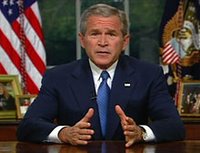This blog is a place for us to give our Analysis and Opinions on important topics related to civics, government and politics. Analysis is a clinical interpretation of items, issues, ideas, or events and an explanation of their impact on the future (i.e. something you think is going to happen). Opinion is composed of your reactions, feelings, and beliefs on items, issues, ideas or events (i.e. something you would like to happen). Even though they are your opinions, they should be based in fact.
Monday, May 15, 2006
Analysis: What impact do you think the May 1, 2006 immigration rallies and May 15, 2006 presidential speech will have on U.S. immigration policy?
 WASHINGTON (CNN) -- Trying to navigate the political minefield of immigration reform in a televised address to the nation Monday night, President Bush called for a "comprehensive" approach to solve "a matter of national importance."
WASHINGTON (CNN) -- Trying to navigate the political minefield of immigration reform in a televised address to the nation Monday night, President Bush called for a "comprehensive" approach to solve "a matter of national importance."Bush called for the short-term deployment of up to 6,000 National Guard troops in a supporting role along the U.S.-Mexico border.
"The issue of immigration stirs intense emotions -- and in recent weeks, Americans have seen those emotions on display," Bush said in his speech.
"In Washington, the debate over immigration reform has reached a time of decision."
Bush outlined an approach combining tougher border enforcement with a guest-worker program for those "who will do anything to come to America to work and build a better life," according advance excerpts of the speech released by the White House.
"We are a nation of laws, and we must enforce those laws," Bush will say. "We are also a nation of immigrants, and we must hold that tradition, which has strengthened our country in so many ways." (More excerpts)
Bush's Oval Office speech was being carried live at 8 p.m. ET on CNN and Pipeline. (Watch the political implications of the debate -- 1:43)
In a nod to conservatives in his base calling for a crackdown on illegal immigration, the president will concede that "we do not yet have full control of the border" and call on Congress to fund "dramatic improvements" in manpower and technology along the U.S.-Mexico border.
He will also reiterate his opposition to giving illegal immigrants already in the country an "automatic path" to citizenship, according to the excerpts.
But in a nod to America's growing and politically vital Latino population, Bush will also make the argument that a guest-worker program is necessary to gain control of the border and relieve the "enormous pressures on our border that walls and patrols alone will not stop."
He will also outline what his top political adviser, Karl Rove, called a "comprehensive vision" for what to do about more than 11 million illegal immigrants already in the country.
"This is a problem of security. It is a problem of our economy. It is a problem of compassion," Rove said in a speech Monday to the American Enterprise Institute. "It is a problem that we have to attack on several different fronts simultaneously if we hope to resolve it."
Bush has long championed a guest-worker program that would allow people to enter the United States to fill jobs for which employers can't find enough American workers.
Monday night, he is expected to offer his most in-depth comments to date on the politically thorny issue of what to do with illegal immigrants already in the country.
The Senate resumed debate Monday on immigration legislation that would create a mechanism by which illegal immigrants could proceed toward legal status, and eventual citizenship, by working for a number of years, paying fines, undergoing a background check and learning English.
Critics dismiss such a legalization process as "amnesty." Supporters reject that term, insisting the process amounts to "earned citizenship."
In his speech, Bush will come out against "amnesty," which he will define as giving illegal immigrants "an automatic path to citizenship," according to the excerpts.
It remains unclear if under that definition the Senate's approach would be acceptable to the president.
Any form of legalization could be a tough sell to members of Bush's own party, particularly in the House, where lawmakers passed an immigration bill in December that contained neither a worker program nor a legalization process.
Critics of a legalization process say it would only encourage more people to cross the border illegally -- and that not enough has been done to increase security in order to stop them.
Thursday, May 04, 2006
Opinion: Who would you like to have as the next president of the U.S.? Give specific reasons.

I would like to see Mario Cuomo run for president and win. He is a great speaker, an intellectual, and an intense advocate for all the people. He would restore confidence in the presidency by explaining what he is doing even when he is making tough decisions. He would make an argument for what he believes in instead of attacking people personally who disagree with him. He's someone I would be proud to follow. Unfortunately, I don't think he'll ever consider running again. Am I stuck in the 80's? If you get a chance, take a look at his speeches at the Democratic Conventions. You can see a picture and listen at: http://www.americanrhetoric.com/speeches/cuomo1984dnc.htm
Analysis: Who do you think will be the presidential nominee for each major poltical party? Who do you think will win in 2008?
I'm going to take an inverse look at that question and say that I don't think it's going to be Sen. Kerry for the Democrats. Although he has raised something like $10 million, I don't think that the Democrats will take the chance with him again. Who was the last multi-campaign candidate? Teddy Roosevelt, William Jennings Bryan?
Subscribe to:
Posts (Atom)